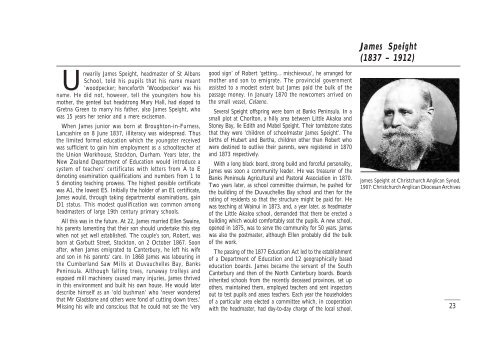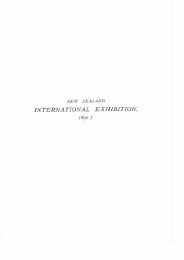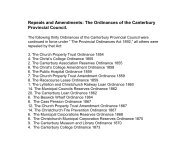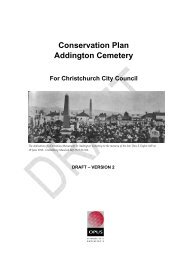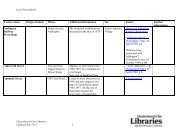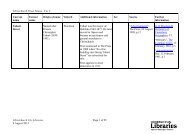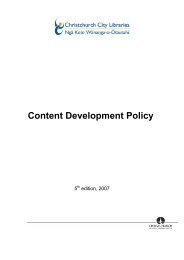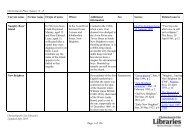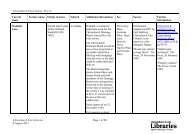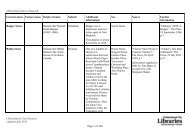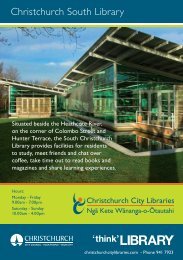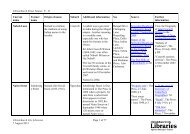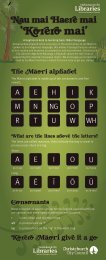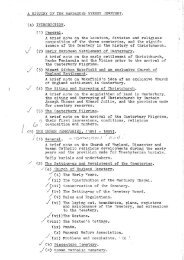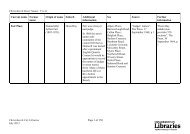Rich man, poor man, environmentalist, thief - Christchurch City ...
Rich man, poor man, environmentalist, thief - Christchurch City ...
Rich man, poor man, environmentalist, thief - Christchurch City ...
Create successful ePaper yourself
Turn your PDF publications into a flip-book with our unique Google optimized e-Paper software.
Unwarily James Speight, headmaster of St Albans<br />
School, told his pupils that his name meant<br />
‘woodpecker; henceforth ‘Woodpecker’ was his<br />
name. He did not, however, tell the youngsters how his<br />
mother, the genteel but headstrong Mary Hall, had eloped to<br />
Gretna Green to marry his father, also James Speight, who<br />
was 15 years her senior and a mere excise<strong>man</strong>.<br />
When James junior was born at Broughton-in-Furness,<br />
Lancashire on 8 June 1837, illiteracy was widespread. Thus<br />
the limited formal education which the youngster received<br />
was sufficient to gain him employment as a schoolteacher at<br />
the Union Workhouse, Stockton, Durham. Years later, the<br />
New Zealand Department of Education would introduce a<br />
system of teachers’ certificates with letters from A to E<br />
denoting examination qualifications and numbers from 1 to<br />
5 denoting teaching prowess. The highest possible certificate<br />
was A1, the lowest E5. Initially the holder of an E1 certificate,<br />
James would, through taking departmental examinations, gain<br />
D1 status. This modest qualification was common among<br />
headmasters of large 19th century primary schools.<br />
All this was in the future. At 22, James married Ellen Swaine,<br />
his parents lamenting that their son should undertake this step<br />
when not yet well established. The couple’s son, Robert, was<br />
born at Garbutt Street, Stockton, on 2 October 1867. Soon<br />
after, when James emigrated to Canterbury, he left his wife<br />
and son in his parents’ care. In 1868 James was labouring in<br />
the Cumberland Saw Mills at Duvauchelles Bay, Banks<br />
Peninsula. Although falling trees, runaway trolleys and<br />
exposed mill machinery caused <strong>man</strong>y injuries, James thrived<br />
in this environment and built his own house. He would later<br />
describe himself as an ‘old bush<strong>man</strong>’ who ‘never wondered<br />
that Mr Gladstone and others were fond of cutting down trees.’<br />
Missing his wife and conscious that he could not see the ‘very<br />
good sign’ of Robert ‘getting... mischievous’, he arranged for<br />
mother and son to emigrate. The provincial government<br />
assisted to a modest extent but James paid the bulk of the<br />
passage money. In January 1870 the newcomers arrived on<br />
the small vessel, Celaeno.<br />
Several Speight offspring were born at Banks Peninsula. In a<br />
small plot at Chorlton, a hilly area between Little Akaloa and<br />
Stoney Bay, lie Edith and Mabel Speight. Their tombstone states<br />
that they were ‘children of schoolmaster James Speight’. The<br />
births of Hubert and Bertha, children other than Robert who<br />
were destined to outlive their parents, were registered in 1870<br />
and 1873 respectively.<br />
With a long black beard, strong build and forceful personality,<br />
James was soon a community leader. He was treasurer of the<br />
Banks Peninsula Agricultural and Pastoral Association in 1870.<br />
Two years later, as school committee chair<strong>man</strong>, he pushed for<br />
the building of the Duvauchelles Bay school and then for the<br />
rating of residents so that the structure might be paid for. He<br />
was teaching at Wainui in 1873, and, a year later, as headmaster<br />
of the Little Akaloa school, de<strong>man</strong>ded that there be erected a<br />
building which would comfortably seat the pupils. A new school,<br />
opened in 1875, was to serve the community for 50 years. James<br />
was also the postmaster, although Ellen probably did the bulk<br />
of the work.<br />
The passing of the 1877 Education Act led to the establishment<br />
of a Department of Education and 12 geographically based<br />
education boards. James became the servant of the South<br />
Canterbury and then of the North Canterbury boards. Boards<br />
inherited schools from the recently deceased provinces, set up<br />
others, maintained them, employed teachers and sent inspectors<br />
out to test pupils and assess teachers. Each year the householders<br />
of a particular area elected a committee which, in cooperation<br />
with the headmaster, had day-to-day charge of the local school.<br />
James Speight<br />
(1837 – 1912)<br />
James Speight at <strong>Christchurch</strong> Anglican Synod,<br />
1907: <strong>Christchurch</strong> Anglican Diocesan Archives<br />
23


